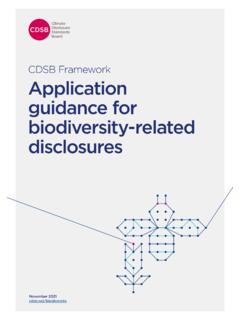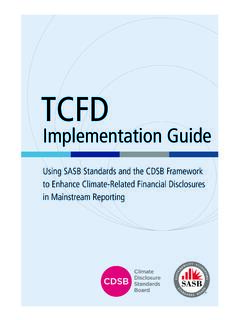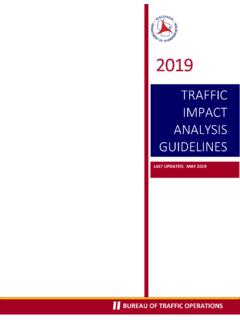Transcription of Accounting for climate
1 Accounting for climateIntegrating climate -related matters into financial reportingDecember Accounting for climate : Integrating climate -related matters into financial reportingCopyright 2020 climate Disclosure Standards Board (CDSB). All rights reserved. Dissemination of the contents of this report is encouraged. Please give full acknowledgement of the source when reproducing extracts in other published work. All information in this report is provided without warranty of any kind, express or implied. The authors disclaim any responsibility for the information or conclusions in this report. The authors accept no liability for any loss arising from any action taken or refrained from being taken as a result of information contained in this is an international consortium of business and environmental NGOs.
2 We are committed to advancing and aligning the global mainstream corporate reporting model to equate natural capital with financial capital. We do this by offering companies a framework for reporting environmental information with the same rigour as financial information. In turn, this helps them to provide investors with decision-useful environmental information via the mainstream corporate report, enhancing the efficient allocation of capital. Regulators also benefit from compliance-ready that information about natural capital and financial capital is equally essential for an understanding of corporate performance, our work builds the trust and transparency needed to foster resilient capital markets. Collectively, we aim to contribute to more sustainable economic, social and environmental systems. For more information, visit or follow climate Disclosure Standards Board on LinkedIn and Twitter We welcome your input and discussions.
3 If you would like to comment on this document, please contact us at Accounting for climate : Integrating climate -related matters into financial reportingCDSB would like to thank the members of the CDSB Technical Working Group s climate Accounting Standards sub-group for their guidance and contribution to the content of this publication. The contents of this publication represents the views of CDSB only, rather than any of the organisations represented in the sub-group. Gordon Wilson, PwC (Chair) Barbara Davidson, Independent Constantin Saleta, Denkstatt David Cooke, 2 Degrees Investing Initiative David Greenall, VIRIDI GLOBAL Derek Ip, BMO Global Asset Management Edwin Ng, International Public Sector Accounting Standards Board Ekaterina Gratcheva, World Bank Emmanuelle Cordano, Independent Greg Rogers, Eratosthenes Jack Easton, Independent Jane Jagd, rsted Jarlath Molloy, NATS John Purcell, CPA Australia Jungfeng Zhao, CECEP Linda Lowson, Global ESG Financial Regulatory Institute Nicolas Desolino, Informa Paul Sutcliffe, EY Richard Spencer, ICAEW Robert Schuwerk, Carbon Tracker Initiative Robyn Seetal, IkTaar Sustainability Simon Weaver, KPMG Stathis Gould.
4 IFACC ontentsIntroduction 05 chapter 1 Are climate -related matters relevant to financial reporting? 1. climate change and the IFRS Standards 082. Regulation, assurance and climate -related financial reporting 103. Investor expectations 114. Summary climate change and financial reporting 12 chapter 2 How should climate -related matters be factored into a company s financial reporting? 1. IAS 1 Presentation of Financial Statements 152. IAS 37 Provisions, Contingent Liabilities and Contingent Assets 173. IAS 36 Impairment of Assets 194. IAS 16 Property, Plant and Equipment 21 chapter 3 Next steps for preparers 22 Appendices Appendix A Illustrative examples 26 Appendix B climate -related legal and regulatory disclosure requirements 48 Appendix C Assurance 49 Appendix D Investor and climate reporting 50 References 515 Accounting for climate : Integrating climate -related matters into financial reporting1.
5 IntroductionThe 2020 edition of the World Economic Forum (WEF) annual Global Risks Report found failure of climate -change mitigation and adaption as its top risk in terms of impact. Additionally, for the first time the top five risks in terms of likelihood were all related to climate change and related environmental climate change clearly poses a significant risk to the world economy. Ultimately, if not addressed climate -related risks will impact the financial position, performance and prospects of all businesses. Article (c) of the Paris agreement commits to [m]aking finance flows consistent with a pathway towards low greenhouse gas emissions and climate -resilient development .2 An estimated US$ trillion a year is required to achieve the Paris Agreement goals by In response, investors, as the primary users of mainstream annual reports, are asking for greater clarity and transparency on the impacts of climate -related matters on 1 climate -Related Risks, Opportunities, and Financial Impact.
6 2017 TCFD Final ReportOPPORTUNITIESSTRATEGIC PLANING RISK MANAGEMENTFINANCIAL IMPACTRISKSINCOME STATEMENTCASH FLOW STATEMENTBALANCE SHEETA ssets & LiabilitiesCapital & FinancingRevenuesExpendituresResource EfficiencyEnergy SourceProducts / ServicesMarketsResilienceOpportunitiesPo licy and LegalTechnologyMarketReputationAcuteChro nicTransition RisksPhysical Risks6 Accounting for climate : Integrating climate -related matters into financial reportingThe Taskforce on climate -related Financial Disclosure (TCFD) recommendations have been a key driver for the inclusion of material climate -related information and potential effects on companies future operations in mainstream narrative reporting (the so called front-half of annual reports) in recent years. Although, disclosure of climate -related financial information by companies has increased per the most recent TCFD Status Report, continuing progress is needed, particularly quantifying the potential financial impacts of climate change on their businesses and Figure 1 of the 2017 TCFD Final Report summarises how climate -related risks and opportunities may have a financial impact on a Investors also require disclosure of the current financial effects of material climate -related issues on a company s financial statements.
7 Disclosure of the financial effects of climate -related matters provides these users with better quality information and thus allows for more efficient and effective engagement, valuation, voting and capital allocation decisions. Disclosure of climate -related matters also enables markets to more effectively price the potential future financial impacts of climate change, which in turn supports the reallocation of capital resources necessary to transition to a low carbon , the inclusion of material climate -related information within financial reporting (the back-half ) could also be improved, particularly in comparison to the narrative disclosures in the front half of annual reports. For example: Research by Deloitte in 2020 on 100 companies listed on the London stock exchange found that while 90% of companies referred to climate change within their annual report, with 64% referring to TCFD, only two companies explicitly referred to climate change impacts in their financial statements6.
8 Similarly, a 2020 CDSB review of the non-financial reporting of 50 of the largest companies in Europe found that 100% of companies provided some narrative disclosure on climate -related matters. Of these companies, 68% referenced the TCFD recommendations, while 42% of companies referred to any environmental matter in their financial reporting, although this was very limited in Further analysis found that only 10% of companies made any reference to climate -related matters in their financial reporting. The UK Financial Reporting Council (FRC) published its climate Thematic in November 2020, which found that only six of the 24 companiesi that were reviewed made any specific reference to climate change in their financial statements, in contrast to 22 companies providing narrative disclosure on climate change.
9 In particular the FRC found it was generally unclear how forward-looking assumptions and judgements applied in preparation of the financial statements were consistent with narrative discussion of climate change .8 Accordingly, CDSB has identified a need to support preparers in integrating climate -related matters into the financial statements. This guidance does not seek to create new Accounting standards in relation to climate -related matters, but builds on International Accounting Standards Board s (IASB) position on how climate -related matters should be integrated into financial reporting based on current International Financial Reporting Standards (IFRS) guidance will seek to address three main questions: Are climate -related matters relevant to financial reporting? How should climate -related matters be factored into a company s financial reporting and what this might look like?
10 What steps can companies take to integrate material climate -related matters into financial reporting?i Note the sample was heavily weighted towards those companies and sectors that the FRC expected to be most affected by climate IASB is the independent body established to develop a single set of globally accepted Accounting standards - IFRS Standards. IFRS Standards have been developed to enhance the international comparability and quality of financial information, in order to enable the primary users of financial reports to make informed economic decisions by providing them with the information to identify opportunities and risks, and make capital allocation decisions. Currently IFRS Standards are required in more than 140 jurisdictions and permitted in many climate -related matters relevant to financial reporting?










